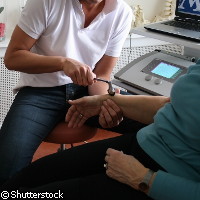Medical devices sense patients who need help
The development and launching of ambulatory assisting devices protect people in need by offering better safety and security. The SENSACTION-AAL ('Sensing and action to support mobility in ambient assisted living') project, funded under the 'Information society technologies' (IST) Thematic area of the EU's Sixth Framework Programme (FP6) to the tune of EUR 2 million, is introducing smart body-fixed sensor-based technology that enables doctors to initiate interventions for patients at home. The SENSACTION-AAL project partners have developed the 'DynaPort Hybrid' device and 'MoveMonitor' application that enable movement sensing, data collection and data transmission in a single compact package. The user's physical movement and body posture are monitored and recorded by the devices that are worn on the user's waist in a special elastic belt. The DynaPort Hybrid device can operate for up to 75 hours on a single battery charge. Data is collected from accelerometers and gyroscopes, and stored on flash memory. The information can then be transmitted to a user's or doctor's personal computer via the Bluetooth wireless protocol. The devices also give users extra support when doing rehabilitation exercises; they can also be configured to signal for help when the user has an accident. 'These devices respond to a growing demand from the medical community for the long-term collection of data from people with mobility problems and motor disorders,' said Rob van Lummel of McRoberts, a SENSACTION-AAL partner from the Netherlands that developed the wireless devices. 'The information they gather allows doctors to better understand a patient's symptoms and in turn treat them more effectively.' For instance, doctors treating people diagnosed with Parkinson's disease will be able to provide better medical support because their assessments will be based on information obtained from the devices and not only from the patients' own descriptions. 'A key feature of our devices is that they allow data to be gathered over a longer period of time, from three to seven days,' van Lummel said. 'This is important because doctors need to see how mobility problems affect people during their daily lives and while performing different activities.' According to the partners, not only will the devices improve the diagnosis of mobility problems, but they will also support patient rehabilitation by informing users that they are performing exercises correctly. Ultimately, patients will become more aware of their motion and posture, and will be able to spend less time travelling to and from hospitals and rehabilitation centres. 'We are certain that, in the future, more and more healthcare services will be provided remotely in the home rather than in hospitals,' van Lummel pointed out. Experts believe that interest in this field of research is growing in both the public and private healthcare sectors. Said project coordinator Lorenzo Chiari of the University of Bologna in Italy: 'We are seeing a lot of interest in remote monitoring solutions. Patients like the sense of safety and reassurance they provide, while healthcare providers see the potential to provide better treatment at lower cost.' SENSACTION-AAL partners are from Germany, Israel, Italy, the Netherlands, Slovakia and Spain.



